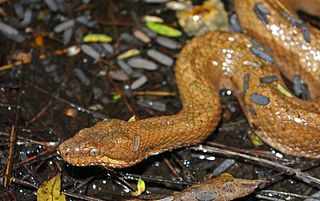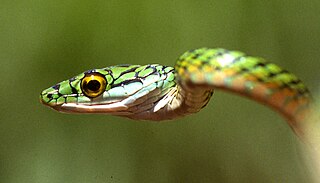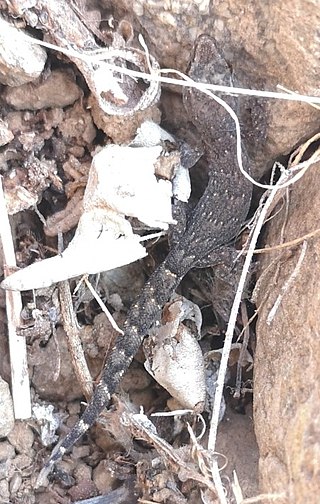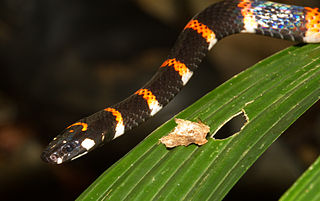
André Marie Constant Duméril was a French zoologist. He was professor of anatomy at the Muséum national d'histoire naturelle from 1801 to 1812, when he became professor of herpetology and ichthyology. His son Auguste Duméril was also a zoologist, and the author citation Duméril is used for both André and his son.

Tantilla is a large genus of harmless New World snakes in the family Colubridae. The genus includes 66 species, which are commonly known as centipede snakes, black-headed snakes, and flathead snakes.

The Natricinae are a subfamily of colubroid snakes, sometimes referred to as a family (Natricidae). The subfamily comprises 36 genera. Members include many very common snake species, such as the European grass snakes, and the North American water snakes and garter snakes. Some Old World members of the subfamily are known as keelbacks, because their dorsal scales exhibit strong keeling.

The Colubrinae are a subfamily of the family Colubridae of snakes. It includes numerous genera, and although taxonomic sources often disagree on the exact number, The Reptile Database lists 717 species in 92 genera as of September 2019. It is the second largest subfamily of colubrids, after Dipsadinae. Many of the most commonly known snakes are members of this subfamily, including rat snakes, king snakes, milk snakes, vine snakes, and indigo snakes.

Tropidophis, common name Caribbean dwarf boas, wood snakes or West Indian wood snakes, is a genus of dwarf boas endemic to the West Indies and South America. Currently, either 17 or 33 species are recognized, depending on the authority.

The Cuban boa, also known as the Cuban tree boa and by locals as maja de Santa María, is a very large species of snake in the family Boidae. With lengths exceeding 5 m (16 ft) and a relatively heavy build, the Cuban boa is one of the largest snakes in the world. The species is native to Cuba and some nearby islands. No subspecies are currently recognized.

Ninia sebae, commonly known as the redback coffee snake or the red coffee snake, is a species of small terrestrial snake in the family Colubridae. The species is endemic to Mexico and Central America south to Costa Rica. Although it resembles some venomous coral snakes in color and size, it is not venomous and seldom bites humans.

Leptophis is a genus of colubrid snakes, commonly known as parrot snakes. The species within this genus are widely distributed throughout Mexico, Central and South America.

The white-lipped mud turtle is a species of mud turtle in the family Kinosternidae. The species is endemic to Central America and northwestern South America.

The Chilean marked gecko is a species of lizard in the family Phyllodactylidae. The species is endemic to Chile, in the Chilean matorral ecoregion. There are three recognized subspecies.

Dipsadinae is a large subfamily of colubroid snakes, sometimes referred to as a family (Dipsadidae). They are found in most of the Americas, including the West Indies, and are most diverse in South America. There are more than 700 species.

Pliocercus euryzonus, commonly known as Cope's false coral snake, is a species of snake in the subfamily Dipsadinae of the family Colubridae. The species is indigenous to southeastern Central America and northwestern South America. There are two recognized subspecies.
Stegonotus is a genus of snakes in the family Colubridae. Species of the genus Stegonotus are native to Australia, Indonesia, and New Guinea.

Cubophis is a genus of snakes in the family Colubridae. They are found in the northwestern Caribbean.
Tretanorhinus is a genus of snakes in the subfamily Dipsadinae of the family Colubridae.

Auber's ameiva, also known commonly as the Cuban ameiva, is a species of lizard in the family Teiidae. The species is native to the Bahamas and Cuba. There are 40 recognized subspecies.

Diploglossus delasagra, also known as the Cuban galliwasp, the Cuban pale-necked galliwasp, or la culebrita de cuatro patas, is a species of lizard in the family Diploglossidae endemic to Cuba.
Pliocercus elapoides, also known commonly as the variegated false coral snake, is a species of snake in the family Colubridae. The species is native to southern North America and northern Central America. There are four recognized subspecies.
Urotheca dumerilli, also known commonly as Duméril's graceful brown snake, is a species of snake in the family Colubridae. The species is endemic to Colombia.

Xenodon dorbignyi, the South American hognose snake, is a species of snake in the family Colubridae. The species is native to southern South America. There are four recognized subspecies.
















